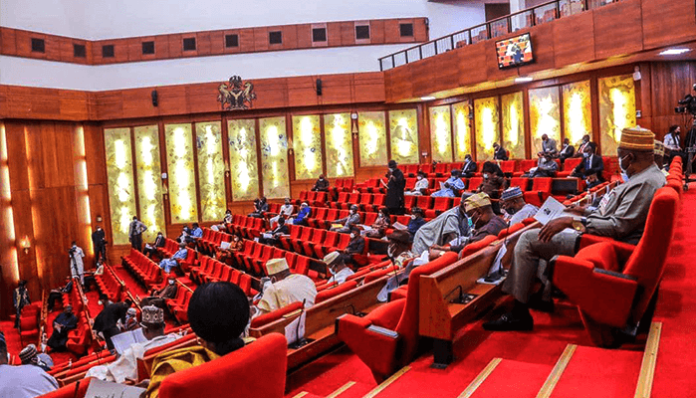As calls for electoral reform intensify across the country ahead of the 2027 general elections, the Nigerian Senate has pledged to review the Electoral Act and introduce reforms aimed at guaranteeing more credible and widely acceptable polls.
The Senate has urged Nigerians to anticipate significant reforms and key priority projects as the second half of the 10th National Assembly begins.
This assurance was given by the Senate Leader, Senator Opeyemi Bamidele, in anticipation of the upper chamber’s resumption after marking two years of legislative activities.
Senator Bamidele, in a statement issued on Sunday, explained that the reforms would cover the nation’s electoral system, a review of the 1999 Constitution, judicial reforms, among others.
Meanwhile, former Chairman of the Independent National Electoral Commission (INEC), Professor Attahiru Jega, has warned that Nigeria’s democracy may collapse if the authorities fail to reform the electoral process.
Jega issued the warning in a paper titled “Required Reforms for Stronger Democratic Institutions in Nigeria”, presented at The Platform Nigeria: June 12, 2025 Edition, organised by The Covenant Nation Global in Lagos. He lamented that despite nearly three decades of uninterrupted civilian rule, Nigeria’s democracy remains dangerously underdeveloped.
The Professor of Political Science, who currently serves as an adviser to the Nigerian President, observed that Nigeria has failed to build the substance of democracy, despite progress in areas such as party campaigns and peaceful political transitions.
He said, “Institutions that work, leaders who serve, and a citizenry that trusts, are stuck in a vicious cycle where those elected to protect democracy become its greatest threat.”
Jega emphasised the need for Nigeria to focus on building a democracy in which power truly serves the people. To achieve this, he said, the nation must fix its broken judiciary and embrace far-reaching institutional reforms to ensure accountability, strengthen the rule of law, and make governance truly serve the citizenry.
He stated, “At the centre of Nigeria’s crisis of governance is the immunity clause in our Constitution. It was intended to protect high office holders like presidents and governors, from frivolous litigation while in office. Instead, it has become a protective shield for corruption and abuse.”
He lamented that the executive arm of government has exploited the immunity clause to embezzle public funds, manipulate institutions, and trample on citizens’ rights with impunity.
According to him, “They know that for four or eight years, they are above the law. This is not democracy, it is elected autocracy. The immunity clause must go. Real-time accountability should apply to all public officers, regardless of rank.”
Jega further noted that in recent years, the Nigerian judiciary has been compromised by political interference, underfunding, and non-transparent appointments. He stressed that judges are often beholden to the executives who influence their appointments and remuneration. As a result, the judiciary delays justice, tolerates impunity, and sometimes aids in subverting the will of the people.
“A democracy without an independent judiciary is like a car without brakes, it’s only a matter of time before it crashes,” he warned.
However, Senator Bamidele, in his statement, emphasised that lawmakers would prioritise reforms to the country’s electoral regime “to ensure every vote continues to count, guarantee good governance, and make participation in the electoral process more engaging for decent and innocent citizens.”
“When you know that if you contest an election, your vote will definitely count, it makes democracy more appealing, enhances voter participation, and strengthens the credibility and transparency of the electoral process,” he said.
“We are also looking forward to greater judicial reforms over the next two years to ensure justice is administered transparently and resolutely. We already have various bills seeking reforms in the judiciary.
“Some of these focus on reviewing how judges and judicial officers are appointed, while others address their tenure and welfare,” he added.
The Senate Leader further explained that the National Assembly had leveraged strategic engagement to carry out its constitutional mandates, enacting legislation that stabilised the country’s fiscal, monetary, and political environments.
He said: “In the 2024/2025 legislative year, for instance, 506 bills were initiated in the Senate alone, compared to 477 in 2023/2024. This represents a 6.07 per cent increase. Also, in the 2024/2025 legislative year, the upper chamber fully passed 83 bills into law compared to 25 in the previous year, a remarkable 232 per cent increase.
“As against 13 executive bills processed in 2023/2024, the Senate addressed 26 in 2024/2025, indicating a 100 per cent surge. This record shows that 464 private member bills were introduced in 2023/2024 compared to 480 in 2024/2025.”
Senator Bamidele also cited the passage of the Tax Reform Bills as a testament to the resolve of the 10th National Assembly to address the country’s fiscal challenges.
He assured that the new bills would implement far-reaching reforms to eliminate structural inefficiencies in tax administration, simplify tax obligations for businesses and citizens, boost investor confidence in the domestic economy, and stimulate growth across all sectors.

